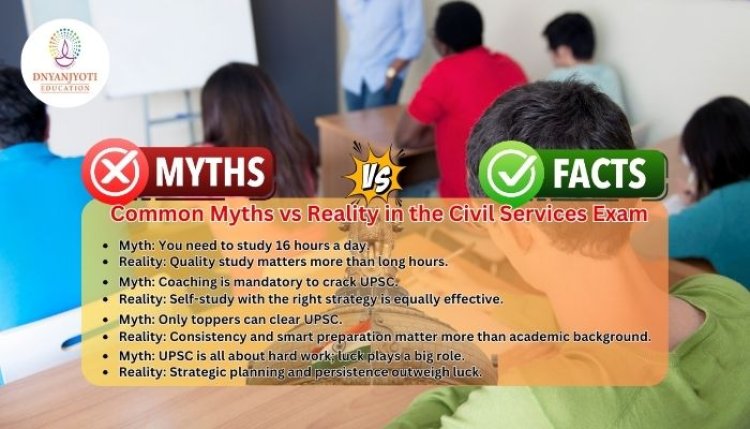Myth vs Reality: Breaking Common Misconceptions About Civil Services
Share this Post to earn Money ( Upto ₹100 per 1000 Views )

Summary:
The civil services exam is one of the most prestigious and challenging exams in India, but it is also surrounded by numerous myths. Many aspirants believe they need to study for 16 hours daily or that coaching is a must to crack the exam. This article busts these misconceptions and provides practical, data-driven strategies to succeed effectively.
Introduction:
The civil services exam is considered the gateway to becoming an IAS, IPS, or IFS officer, attracting lakhs of aspirants every year. However, many myths discourage potential candidates from even trying. This article demystifies some of the most common misconceptions and sheds light on what truly matters in UPSC preparation.
Debunking Common Myths About the Civil Services Exam
Myth 1: You Need to Study 16 Hours a Day
Reality: Studying long hours does not guarantee success. The focus should be on quality over quantity.
Many toppers, including AIR-1 rankers, have shared that they studied for 6-8 hours daily with high concentration rather than 16 hours with distractions. Smart study techniques like active recall, mind maps, and time management play a crucial role in effective learning.
Myth 2: Coaching is Mandatory to Crack UPSC
Reality: Coaching can help, but it is not a necessity.
With the vast availability of free resources such as NCERT books, government reports, and online platforms like YouTube and PIB, self-study has become more feasible. Coaching institutes provide structure, but self-discipline, consistency, and strategic planning can lead to success without formal coaching.
Myth 3: Only Toppers or Scholars Can Clear the Exam
Reality: UPSC has no preference for academic toppers.
Several successful candidates have had average academic backgrounds but excelled due to their perseverance and smart preparation. The exam tests analytical ability, decision-making, and problem-solving skills, which can be developed with practice.
Myth 4: You Must Read Every Book Ever Written on UPSC Syllabus
Reality: Strategic selection of study materials is key.
UPSC does not expect aspirants to memorize everything. Instead, it requires in-depth conceptual clarity. Limiting sources and revising them multiple times is more effective than trying to cover an exhaustive list of books.
Myth 5: Writing Skills Are Not That Important
Reality: Answer writing is a crucial component of the Mains exam.
Even if an aspirant has vast knowledge, without proper answer writing skills, scoring high in the Mains examination is difficult. Practicing answer writing daily, adhering to time limits, and structuring answers with proper introduction, body, and conclusion significantly improve performance.
Myth 6: English Proficiency Is Necessary to Clear UPSC
Reality: The exam is conducted in multiple languages.
Many candidates clear the UPSC exam by writing in their regional languages. The focus should be on conceptual clarity and effective communication rather than fluency in English.
Myth 7: UPSC is All About Hard Work, Luck Has a Huge Role
Reality: Smart work matters more than luck.
Luck may play a small role in competitive exams, but preparation strategy, consistency, and analytical thinking outweigh random luck. Understanding the exam pattern, prioritizing topics, and making informed decisions improve chances of success.
Myth 8: Optional Subject Determines Success
Reality: While choosing the right optional is important, it alone doesn’t guarantee success.
Candidates should choose an optional subject based on interest, background, and available study materials. General Studies carries more weightage, so balancing both effectively is crucial.
Smart Study Strategies for UPSC Aspirants
1. Focus on Syllabus and Previous Year Papers
Understanding the syllabus and analyzing past papers helps in identifying important topics and avoiding irrelevant materials.
2. Follow an Integrated Approach
Studying for Prelims and Mains simultaneously ensures better retention and reduces stress after the Prelims results.
3. Develop a Personalized Study Plan
Aspirants should create realistic study schedules that accommodate breaks, revision, and answer writing practice.
4. Use Technology Wisely
Online platforms, mobile apps, and digital notes help optimize preparation time. Government portals like PIB, PRS, and NITI Aayog provide relevant information.
5. Join Test Series and Peer Discussions
Participating in test series helps in time management and self-evaluation, while discussions with fellow aspirants aid in different perspectives and conceptual clarity.
6. Maintain Physical and Mental Well-being
Adequate sleep, regular exercise, and stress management techniques like meditation improve focus and productivity.
External Resource:
For more details on the UPSC examination structure, visit the Wikipedia page on the Civil Services Examination.
Final Thought
Success in the civil exam is not about myths but about smart strategies, consistency, and the right mindset. Every aspirant’s journey is unique, and what works for one may not work for another. By busting these myths and adopting practical approaches, candidates can significantly enhance their chances of success.
If you're looking for expert guidance and structured preparation, connect with Dnyanjyoti Education Nagpur for the best mentorship and UPSC coaching in Nagpur.
















